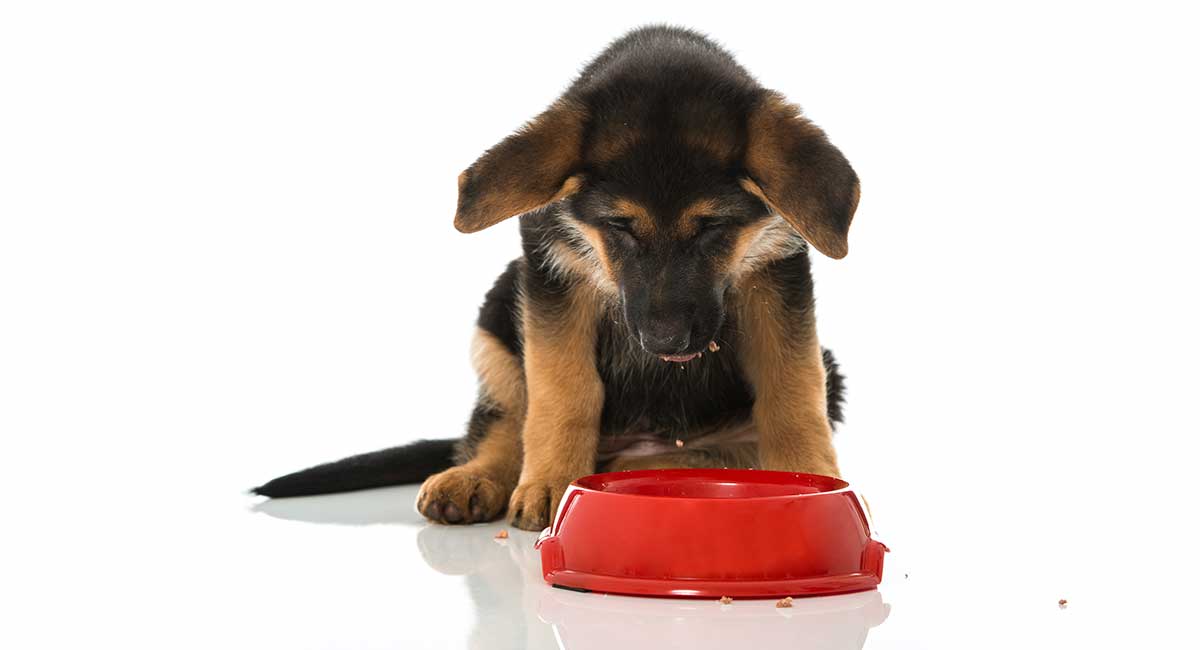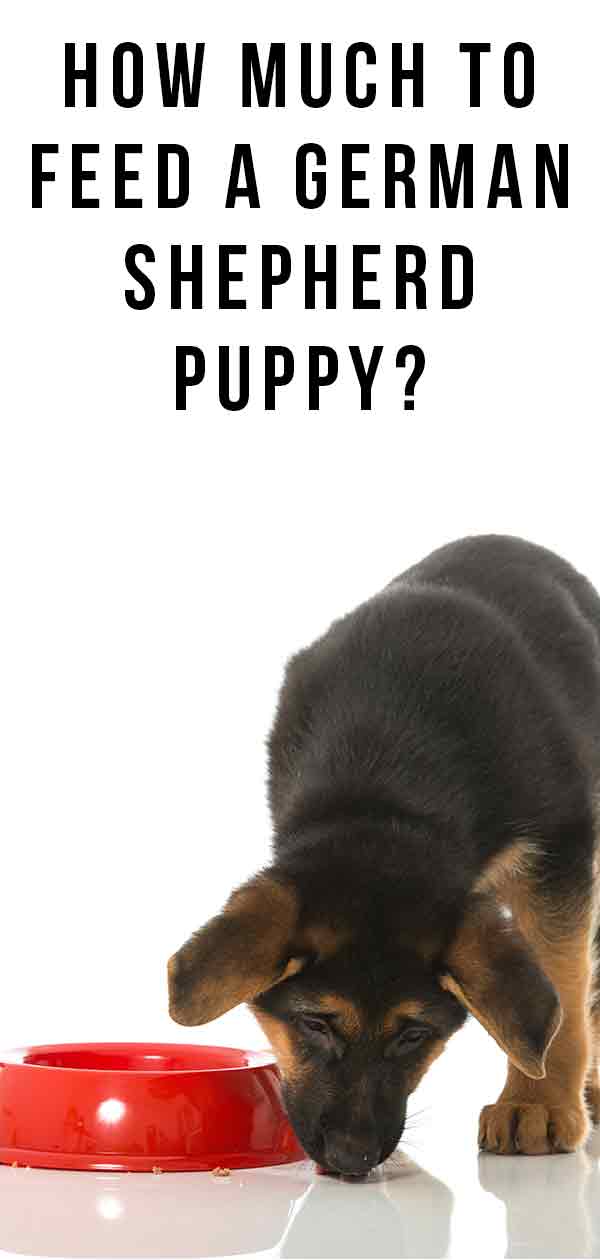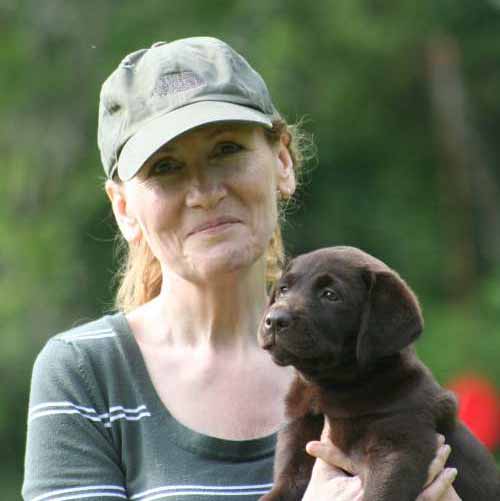How Much to Feed a German Shepherd Puppy Per Day
 Wondering how much to feed a German Shepherd puppy? We've got the answers!
Wondering how much to feed a German Shepherd puppy? We've got the answers!
From the day you bring them home, to the time they move onto adult food.
After all, the typical GSD puppy feeding guide can change almost daily as your puppy grows bigger and stronger!
Puppyhood may be all too short, but it is a critically important time for your new puppy's adult health and well-being.
In this article, we take an in-depth look at the German Shepherd puppy food diet.
Giving you trustworthy German Shepherd puppy feeding guidelines to supplement instructions given by your puppy's breeder and veterinarian.
3 Keys to a Healthy GSD Puppy
Veterinary research tells us that large breed puppies such as the German Shepherd need a different diet and feeding schedule than do medium or small breed puppies.
Incorrect feeding early in life can result in a lifelong impact to your puppy's health!
In fact, diet is only one of three vital keys to raising a healthy GSD puppy.
Environment and genetics each intersect with your puppy's diet to determine how healthy he or she will be as an adult.
For this reason, your first and best resources to create a healthy German Shepherd puppy feeding guide should be your veterinarian and your puppy's breeder.
Even if you don't want to keep your new pup on the same food the breeder was using, wait a few weeks before beginning the food transition so your puppy can settle in first.
What Type of GSD Puppy Food to Feed
There are four types of puppy food: dry kibble, wet food, homemade food, and raw food.
Because puppyhood is a very brief period of time – less than one year of your dog's life! – and feeding complete and balanced nutrition is simply vital for adult health, most owners opt for commercial dry kibble that is "nutritionally complete and balanced" with wet food supplementation as needed.
Homemade dog food can be really challenging to make in a way that ensures it is complete and balanced nutritionally.
In most cases, you will need to work closely with your dog's veterinarian to add in additional vitamins and minerals for full and complete daily nutrition.
Raw Food
Raw food can also be problematic because your puppy's immune system is not yet fully developed.
If you choose to start out feeding your puppy a raw food diet, be sure to talk with your veterinarian about the safest way to offer raw meals.
(Freeze-dried commercial foods are a good choice here.)
Ultimately, it is your choice what diet to feed your GSD puppy, but it is good to know all the options so you can talk with your veterinarian about what is best for your puppy's health!
One area where new puppy owners often feel a lot of anxiety is around how much to feed a German Shepherd puppy per day.
You don't want your puppy to be too round or too skinny but just right!
German Shepherd Puppy Feeding Guidelines
Here are some general German Shepherd puppy feeding guidelines that may be helpful to consider as you plan your puppy's menu:
- Puppies (of all breeds) typically need to eat more than adult dogs.
- The puppy diet is usually higher in fat (26 percent) and protein (15–18 percent) than the adult dog diet.
- A good puppy food will always meet these two criteria: it is formulated for large breed puppies AND it offers "complete and balanced nutrition."
- Do not provide extra vitamins and minerals unless your veterinarian advises otherwise.
- Puppies generally eat at least three times per day, whereas adult dogs may eat twice or even just once per day.
- Puppies always need access to plenty of fresh water during and in between meals.
- A common age to switch GSD puppies from puppy food to adult dog food is 12 months.
German Shepherd Puppy Feeding Amount
Figuring out how much to feed a German Shepherd puppy is not an exact science because your puppy's genetics and environment also factor in to how hungry your puppy is and how much he or she eats.
For example, canine researchers now know that male German Shepherd puppies typically grow up to be quite a bit heavier and taller than female GSD puppies.
So if you are caring for a boy puppy, your pup may eat more and grow faster than if you were caring for a girl puppy!
Also, your puppy's parents can influence adult size regardless of sex.
As well, your choice of when to neuter or spay your puppy can influence appetite and development.
If you spend a lot of time playing with your new puppy, he may burn more calories than if your pup is more sedentary, and this can influence mealtime hunger and overall growth.
DOD
These caveats aside, it will be important to monitor your puppy's weight and growth quite closely to avoid known metabolic dangers such as developmental orthopedic disease, or DOD.
DOD represents a range of conditions where too much weight too early in life can put pressure and stress on the bones and skeletal system, causing improper development.
First, take your puppy's baseline weight (measured by your veterinarian for the best accuracy).
As you start your feeding schedule, keep notes about how hungry your puppy is and how much he eats at each meal.
In addition to regular weigh-ins, ask your veterinarian to teach you how to feel your dog's body to monitor weight gain.
During appropriate weight gain as your puppy grows, you should be able to feel but not see your puppy's rib cage.
Err on the side of leanness unless your veterinarian specifically directs you otherwise.

When to Stop Feeding German Shepherd Puppy Food
Another common question new puppy owners often ask is, "How long should I feed my German Shepherd puppy food?"
Figuring out when to take German Shepherds off puppy food is the topic of continued debate.
Different breeders have different feeding philosophies about the best time to transition from puppy food to adult dog food.
This process can occur as early as 16 weeks (four months) or as late as one year.
Typically, you will see most puppy owners beginning the process between the ages of five and six months old and 1 year.
Change of Food and Change of Amount
How much to feed a German Shepherd puppy may also change based on when you begin the transition from puppy food to adult dog food.
If you choose to keep your GSD puppy on puppy food for longer, you may want to slightly decrease portion sizes per meal as your puppy grows up.
Conversely, if you switch your puppy over to adult food earlier, you may want to slightly increase portion sizes.
Discuss this with your veterinarian if you are unsure which approach is best for your puppy's health.
German Shepherd Puppy Feeding Schedule
While some breeders and puppy owners believe in free feeding, where your puppy always has access to dry kibble, this is not advisable because it makes it quite difficult to figure out how much your puppy is really eating!
Rather, work with your breeder and veterinarian to develop a set, fixed feeding schedule that supports slow, steady growth.
It helps with housebreaking as well.
Feeding Frequency
Some breeders may feed their GSD puppies twice per day, but in most cases the initial feeding schedule will begin with four daily feedings, starting during the weaning process.
Then around the age of eight weeks, breeders might recommend transitioning to three daily feedings spaced at equal intervals.
The last feeding should be a few hours prior to your puppy's bedtime to avoid night time accidents.
Around the age of 9 to 12 months, you can transition to twice daily feedings in the morning and in the evening.
From the age of 12 months forward, twice daily feedings is the norm unless your veterinarian advises otherwise.
Feeding Amount
You may need to adjust your German Shepherd puppy food amount based on weight, growth, visible hunger, and your vet's recommendations.
This is a general purpose guide to how much food to offer at each stage of puppyhood.
- Up to 16 weeks old: Offer ½ to 1 full cup of food at each meal.
- 16 weeks to 9 months old: Offer between 1 cup and 1¾ cup of food at each meal.
- 9 months to 12 months old: Offer between 2 cups and 2½ cups of food at each meal.
- 12 months old: Offer 2½ to 3½ cups of food at each meal.
Mealtime Length
Figuring out how much to feed a German Shepherd puppy often boils down to simple observation and asking the right questions, such as:
- How hungry is she at mealtimes?
- How long does it take her to finish her food?
- Does she still seem hungry after all the food is gone?
For general purposes, a mealtime length of 10 to 15 minutes is typically sufficient.
If your puppy hasn't eaten her entire portion after 15 minutes, chances are she is full.
If your puppy continues to eat hungrily after 15 minutes, you may want to talk with your veterinarian about whether to increase the portion per feeding.
Water
While you are housebreaking your GSD puppy, it can be a good idea to remove access to water a few hours before you plan to put him to bed to avoid night time accidents.
However, your GSD should have access to water at all other times.
How Much to Feed a German Shepherd Puppy
We hope this article about how much to feed a German Shepherd puppy has given you the information and confidence to give your GSD puppy a nourishing start in life!
Sources
- Larsen, L. DVM, PHD, DACVN. Focus On Nutrition — Feeding Large-Breed Puppies. VetFolio Life Stages Management Compendium, 2015.
- Wynn, S. DVM. Feeding Large Breed Puppies. IVC Journal, 2013.
- Schlesinger, D.P. et al. "Raw food diets in companion animals: A critical review. Canine Veterinary Journal, 2011.
- McReynolds, T. Study reveals sex-specific genetic traits in German shepherd dogs. NewStat Veterinary Breaking News/AAHA, 2017.

Free Training Tips
Get Pippa's free dog training tips delivered to your inbox
Source: https://dogsnet.com/how-much-to-feed-a-german-shepherd-puppy/
0 Response to "How Much to Feed a German Shepherd Puppy Per Day"
Post a Comment